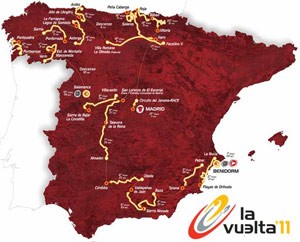Exciting route announced for Spanish Grand Tour
 Following on from rumours that the featured Angliru climb, one of the toughest in cycling, will return to the Vuelta a España in 2011, today’s route launch in Alicante has brought confirmation of that and also of the inclusion of two new summit finishes in the race.
Following on from rumours that the featured Angliru climb, one of the toughest in cycling, will return to the Vuelta a España in 2011, today’s route launch in Alicante has brought confirmation of that and also of the inclusion of two new summit finishes in the race.
The first-time use of the Estacion de Montaña Manzaneda in Galicia and La Farrapona in Asturias will see the GC contenders slug it out on unfamiliar territory, with other uphill battles to come on l’Angliru, the gruelling San Lorenzo del Escorial, Valdepeñas de Jaen and Peña Cabarga, where race leader Igor Anton crashed out of the 2010 edition of the race.
The race will also feature a long-awaited return to the Basque Country, some 33 years after it last visited the Pais Vasco region. The visit is of historical significance as it comes after a period of peace between the region and the Spanish government, and also after this week’s announcement that the Basque separatist group ETA has called a permanent ceasefire.
Political tensions have been a big part of the reason why the race hasn’t visited the region in such a long time.
Starting in Benidorm on August 20th, the third Grand Tour of the season will feature 21 stages, a total distance of 3295 kilometres, two time trials and six summit finishes. With ten mountain stages in all, the advantage is definitely handed to the climbers as one of those time trials is a 16 kilometre team effort, while the individual test is just 40 kilometres long.
Following a penultimate day mountains showdown in Vitoria, the race will conclude on September 11th in Madrid.
Route analysis here:
—-
Vuelta a España 2011 (Grand Tour/UCI World Tour event):
Stage 1, Saturday 20 August: Benidorm – Benidorm, 16 km (team time trial)
Stage 2, Sunday 21 August: La Nucía – Playas de Orihuela, 171.5 km
Stage 3, Monday 22 August: Petrer – Totana, 164 kilometres
Stage 4, Tuesday 23 August: Baza – Sierra Nevada, 172 kilometres (mountain stage)
Stage 5, Wednesday 24 August: Sierra Nevada – Valdepeñas de Jaén, 200 kilometres
Stage 6, Thursday 25 August: Ubeda – Córdoba, 185.7 kilometres
Stage 7, Friday 26 August: Almadén – Talavera de la Reina, 185 kilometres
Stage 8, Saturday 27 August: Talavera de la Reina – San Lorenzo de El Escorial, 182 kilometres (mountain stage)
Stage 9, Sunday 28 August : Villacastín – Sierra de Bejar. La Covatilla, 179.5 kilometres (mountain stage)
Stage 10, Monday 29 August, Salamanca – Salamanca, 40 kilometres (individual time trial)
Rest day, Tuesday 30 August
Stage 11, Wednesday 31 August: Verín – Estación de Esquí Alto de la Manzaneda, 171 kilometres (mountain stage)
Stage 12, Thursday 1 September: Ponteareas – Pontevedra, 160 kilometres
Stage 13, Friday 2 September: Sarria – Ponferrada, 150 kilometres (mountain stage)
Stage 14, Saturday 3 September: Astorga – La Farrapona. Lagos de Somiedo, 173.2 kilometres (mountain stage)
Stage 15, Sunday 4 September: Avilés – Anglirú, 144 kilometres (mountain stage)
Rest Day, Monday 5 September
Stage16, Tuesday 6 September: Villa Romana La Olmeda (Palencia) – Haro, 180 kilometres
Stage 17, Wednesday 7 September: Faustino V – Peña Cabarga, 212.5 kilometres (mountain stage)
Stage 18, Thursday 8 September: Solares – Noja, 169.7 kilometres (mountain stage)
Stage 19, Friday 9 September: Noja – Bilbao, 157.9 kilometres
Stage 20, Saturday 10 September: Bilbao – Vitoria, 187 kilometres (mountain stage)
Stage 21, Sunday 11 September: Circuito del Jarama – Madrid, 94 kilometres